Professor Werner Kirstein: Man-made climate change is a scam orchestrated by politicians
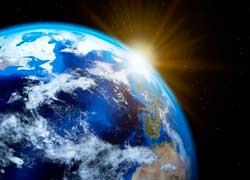 Experienced geographer-climatologist, Prof. Werner Kirstein speaks in plain language. In an interview on December 1, 2022, he points out that climate change has existed and has always existed, completely independent of people and CO2. Allegedly man-made global warming is a scam orchestrated by politicians. Politicians commissioned studies to deceive the public. Fear of a climate catastrophe is created in such a way that people become submissive and do what is asked of them.
Experienced geographer-climatologist, Prof. Werner Kirstein speaks in plain language. In an interview on December 1, 2022, he points out that climate change has existed and has always existed, completely independent of people and CO2. Allegedly man-made global warming is a scam orchestrated by politicians. Politicians commissioned studies to deceive the public. Fear of a climate catastrophe is created in such a way that people become submissive and do what is asked of them.
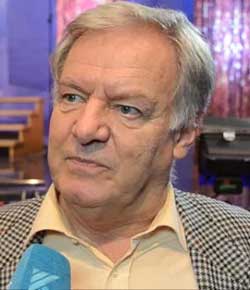 Prof. Dr. Werner Kirstein, born in 1946, studied physics and climatology/climate geography at the University of Würzburg. His field of activity in physics was "Theoretical thermodynamics", and in geography - "Global and regional climate variability". After a doctoral dissertation (1981) on the topic: “Frequencies of correlations between solar activity and climate elements”, scientific activity at the Jülich Research Center, habilitation (the procedure for obtaining the highest academic qualification) on the topic (1991): “Geographical patterns of distribution of modern Climate Variability - Aspects of Climatic Geography of the Northern Hemisphere”, and a teaching position at the University of Würzburg, from spring 1997 until his retirement in 2011, he held a professorship at the University of Leipzig.
Prof. Dr. Werner Kirstein, born in 1946, studied physics and climatology/climate geography at the University of Würzburg. His field of activity in physics was "Theoretical thermodynamics", and in geography - "Global and regional climate variability". After a doctoral dissertation (1981) on the topic: “Frequencies of correlations between solar activity and climate elements”, scientific activity at the Jülich Research Center, habilitation (the procedure for obtaining the highest academic qualification) on the topic (1991): “Geographical patterns of distribution of modern Climate Variability - Aspects of Climatic Geography of the Northern Hemisphere”, and a teaching position at the University of Würzburg, from spring 1997 until his retirement in 2011, he held a professorship at the University of Leipzig.
Interview
- There has always been climate change
Milena Preradovic: You are the author of the book "Climate change - reality, mistake or lie". Let's start with the first line. Climate change is real, right?
Professor Kirstein: Yes, that's true. And everything else is also correct, this is the most madness. It may also make you want to read a book. So perhaps you see: the reality is there, but there is also a mistake, and there is a lie.
So, reality: climate change has always been, especially if you go back to the prehistoric history of the earth, you can see very strong changes. I mean ice ages. It was always very cold there, then a warm period came, then the temperature increased greatly, then there was another ice age, and another warm period. This was repeated five or six times. 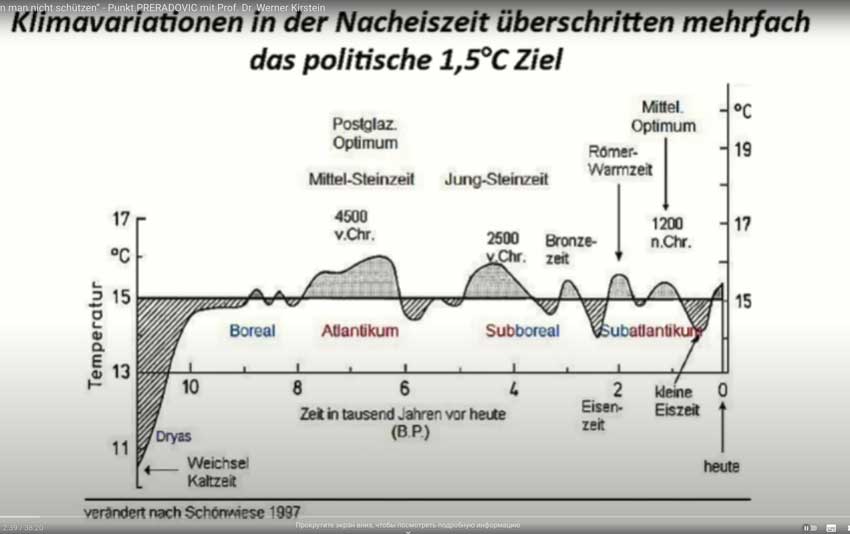
Graph, see video min. 2:40
On the graph you can see the extreme left corner where we come out of the last ice age, there is actually a curve at the bottom, so at the end of the ice age the temperature went up 15-20 degrees, 15-20°! Today, politicians are talking about 1.5°.
Question: And there were not only ice ages, there were also warm periods. Was it warmer than today?
Professor Kirstein: Yes, much warmer. The last interglacial was much warmer than today. And even in historical times, as the graph shows, it was also significantly warmer. ...
Question: What are the causes of ice ages and warm periods?
Professor Kirstein: You are touching on a sensitive topic. When I was a student, it was assumed that the so-called Milankovitch cycles were responsible for these strong changes. This means that these are the elements of the earth's orbit that are shifting, changing - the position of the Sun with its planets also changes in the galaxy - and the elements of the earth's orbit of the inclination of the earth's orbit, eccentricity and all sorts of things like that. It's a pretty complicated story.
And then there were people who said: "Oh, it's not like that at all, it's something else." So, from my point of view, the issue is settled. But this is a rather complicated process.
Question: What about solar activity? Some say that solar activity also affects it.
Professor Kirstein: Yes, it also has an influence, but this influence can only be proven when we know solar activity, that is, it can be determined numerically. And so it was only 150 years, a maximum of 200 years. About the last interval I can say: yes, the sun is involved. But these are small amplitudes, the large ones I spoke about have other reasons.
- It might get colder
Question: Supporters of anthropogenic climate change always say: yes, there was climate change, but never in the history of the Earth has the climate warmed so quickly. You always hear it. Right?
Professor Kirstein: It's not like that at all. This is the kind of propaganda you want to do. You want to scare people, that was the principle. And then you really turn the lever of fear and say, “Now it has increased very rapidly. If you look at the chart, you can also see that it went relatively fast, then slower again, and then faster again. Thus, these periods of slow and fast also (respectively) change.
Question: Will it really get warmer and warmer at the present moment, that is, now, since 2000 or 1980, as propagated?
Professor Kirstein: No, it won't. It gets a little warmer, and it gets less warm again. It is true that CO 2 emissions continue to rise. And this is mistakenly considered the cause. It's still growing, but the temperature is doing something completely different.
Question: Is it really possible to estimate whether it will become warmer or colder in the coming decades?
Professor Kirstein: So, what happens in the future is always great. Very hard. The so-called climatologists - for me they are pseudo-scientists - they work with models, they are guided by models and they say: according to the models, it will be even warmer. Now in Russia and Japan there are scientists who say: in the future it will not be warmer, on the contrary, it will become colder. And now the reason is related to the summer activity, because it is now decreasing. And because of this, it might get colder now.
Question: Do you also think that this is possible? Do you agree with Russian scientists?
Professor Kirstein: I think it's possible, but I'm always reluctant to make predictions. I do it like Niels Bohr, the famous physicist, who said, "Prediction is always difficult, especially when it comes to the future." So, you can make predictions, but I don't want to do that. I say: yes, it may get colder, not warmer, yes, I agree, but it is impossible to give exact figures.
- Delirium and deception of climate models
Question: Let's get back to models very briefly. Do these climate models make sense?
Professor Kirstein: No, they don't make any sense to me. Then people from the Potsdam Institute for Climate Impact Research replied that they were not climatologists or meteorologists at all, they were having fun with a computer. And then they enter the data that they have, and the more data they have, the better it is, and then you get this - someone once said, I don’t remember, it was purely American or Canadian: I can here enter what I want, what I want, in the end, I always get what I need.
Question: Are these models made in this way, that is: is the result already laid down when creating models?
Professor Kirstein: Yes, not the result yet, they are still calculating something, but of course you are very dependent on the input data and you don't even know all of them. Some of the parameters that play a role here are known, but, for example, the circulation of the atmosphere, this is a big mystery, it cannot be predicted. Sea currents are also known, but they sometimes have variations. So, there are some things that are very difficult to type into a computer. And that's why models are a trick for me.
Question:It seems that there was a climategate in 2009. Do you remember? What was it, can you enlighten me again? Were there also scientists, or was there an email leak in the end where the scientists essentially got the wrong results and tried to cover it up?
Professor Kirstein: Well, all I know is that Prof. von Storch, who was also on the IPCC (Intergovernmental Panel on Climate Change), said: At the moment we are not seeing any warming, and if this continues, then we will have to use changes to our models. And that's a strong statement. He was a supporter of these models.
- No link between CO2 and warming
Question: Now we come to what the proponents of anthropogenic climate change are saying. They say: the more CO2 gets into the atmosphere, the hotter it gets here. What do you say as geographer-climatologist?
Professor Kirstein: Yes, it's not true! Because the fact is that CO2 emissions have always increased and will continue to increase. There are certain reasons for this - we are happy to eliminate them - but this does not affect the temperature.
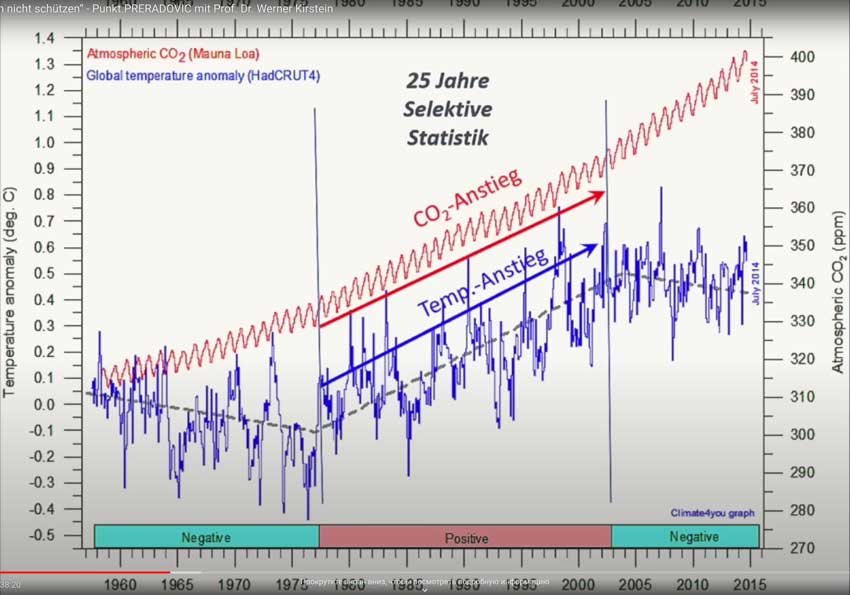
Graph, see video min. 9:43
We have this graph, you can clearly see that the curves are parallel in the middle of this graph, that the temperature rise is the same as CO2. Then, in 1985, people said: "We have evidence that the temperature rises with the increase in CO2".
But it's not right! Because if you look at the left side of the graph, you can see that these 25 years are anti-parallel. This means that the level of CO2 has increased, but the temperature has not increased, but decreased. And now, since about 2000, it seems that the situation is diverging again, that is, the parallelism, the correlation between temperature increase and CO2 increase is no longer true. This is a random correlation.
Question: So for a while that was true, the two meanings went side by side. And from this it was concluded that the connection is direct?
Professor Kirstein: It is concluded that there is a causal relationship. But this causal connection is not true, it is a random connection. And there are a lot of random connections in statistics. Think of at least one example: a decrease in the number of storks and a decrease in the birth rate. It fits very well. …
Question: So, does CO2 matter all for climate shifts or climate fluctuations as it's also called?
Professor Kirstein: Yes, I strongly believe - I also know this from other colleagues - that CO2 does not affect the climate at all. The scientific journal contains the works of prof. Gerlich and Scheuschner - this was, of course, recently, now they are both dead - they wrote, I will immediately translate: "Falsification (chapter Refutation) of CO2 - Greenhouse effect in the context of physics." So, physics says: no, it does not exist. Who says "yes ", which is within the framework of politics. ...
Question: So, if CO2 enters the atmosphere, it doesn't have any effect on the temperature?
Professor Kirstein: No, no effect. As I said, it was by accident, 25 years old, and it has no effect. It is assumed that if CO2 increases, the temperature will also increase. It happened by accident within 25 years, but it has no causal background.
5. Political shenanigans
Question: This image is not a secret, you must know it from the Intergovernmental Panel on Climate Change, right?
Professor Kirstein: Yes, you know that too. Therefore, I am of the opinion that the people who are defending this know exactly what is going on and that the population should not know this and should be considered stupid. This is the motto of politics: the less people know, the more we can tell them.
Question: What's the point of that then?
Professor Kirstein: Yes, in the end it means that people are afraid of a climate catastrophe. Fear is already a lot: mad cow disease, swine flu and, as far as I know, a very long list. And if you scare people, they will become obedient and do exactly what the politicians say, like taxing CO2 emissions. Then no one will object to it. Yes, CO2 needs to be taxed, more money needs to be made to prevent this catastrophe. This is of course contrived. Very few people know this.
Question: Do we really have a high enough concentration of CO2 now?
Professor Kirstein: Right now we have 420 ppm (parts per million), which is 420 parts per million parts of air. This is very little. There are people who say: it was much more or less, we have the maximum level today - this is also not true. Fifty years ago we had 500 parts per million. To put it in an extreme way - even though no human has lived there before - millions of years ago we already had 7,000 parts per million. So, the CO2 level also varies and does not always increase, but it also decreases again.
Question: Can CO2 be dangerous if its concentration exceeds a certain amount?
Professor Kirstein: Yes, it's dangerous - if I'm talking here more from the experience of the neighbors, then - people who want to commit suicide have a plastic bag put on their heads. And then they don't suffocate, they exhale CO2 and CO2 causes drowsiness and they fall asleep peacefully, they don't even need to take any pills. So, it's dangerous, it can be lethal, but in high concentrations.
Question: Are we far from it?
Professor Kirstein: Yes, very far (laughs).
Q: Now the question is: how much CO2 is actually produced naturally and how much is produced by humans?
Professor Kirstein: Yes, you can say: There are estimates about this, and in my opinion, they are quite accurate. It is said that about 3-4% of CO2 comes from human activities - a variety of things, including cars, machines, etc., and 96-97% - from nature. For example, the main contribution is made by gas release from the oceans. CO2 is dissolved in the sea, just like in a bottle of mineral water. It is also dissolved there in the form of a gas, and when you open it and heat it, CO2 comes out. Conversely, it does not go back into the bottle, but in nature the opposite is true: when it gets cooler, CO2 goes back into the sea, that is, it turns into a solution again, as the chemist says. And the whole game goes back and forth, but always for very long periods of time.
Question: But it's always said that anthropogenic CO2 levels spoil the climate. But, as you put it, 3%, then the person has no effect on the concentration of CO2.
Professor Kirstein: No, no, no. And if you look at the graph (see video min. 16:07) of the amount of CO 2 emissions worldwide, you will see that such large countries as China (30.6%), Japan (3%), India (7%) and the US (13.5%) account for more than half of CO 2 emissions , while Germany with 1.8% is a very small figure. But of course, we are the pioneers, that is, the German politicians, we have to convince the rest of the 1.8% that it is good to reduce CO2, which is actually nonsense.
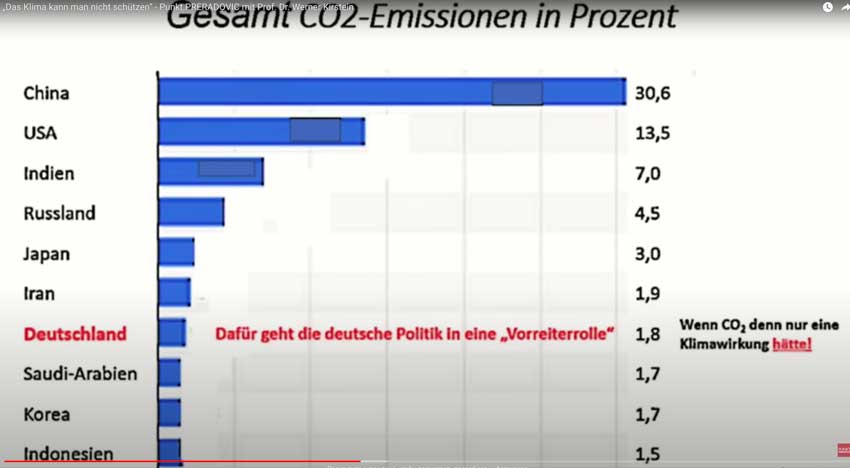
And the second nonsense: CO2 does not affect the temperature at all. So here they are subjected to a double "mistake". Of course, this is not a mistake, politicians know this, and I am also sure: Merkel is also a physicist, she should have known this too. And I'm also sure that our government knows this, except perhaps the Greens, who are not so knowledgeable. I also did this in a new book I'm currently working on the lack of education in politics.
Question: Are all countries of the world involved in this anthropogenic climate change?
Professor Kirstein: It's hard to answer, because there are always those who say that we are not impressed, for example, Russia, which also took its stand and did not allow itself to be blackmailed - that was another question - but they always say: no, we are not so we think. Most say yes, because it makes money. It all brings in money, carbon taxes, so that's why you say 'yes' to this in the first place.
Question: It is now assumed that CO2 emissions are not only being reduced, but are actually banned entirely, not to mention that I find it difficult after you just said that most CO2 emissions are natural. But what would be the consequences without CO2?
Professor Kirstein: That would be fatal, absolutely fatal. Because vegetation needs CO2, it inhales CO2 , so to speak. And if we stop providing this, then all the vegetation will die, and with it the fauna. Flora and fauna on Earth would perish. So, it will be death. You can see what goals the politicians set for themselves. They want to expel CO2 from the atmosphere, and because of this, you are in a deadly situation.
- Methane gas
Question: Methane has been named as the second culprit of the greenhouse effect. What happened to him?
Professor Kirstein: At that time, methane was also classified as a climate gas, but it is much less in the atmosphere than CO2. If it had an effect, it would be even less. But, like CO2, it has no direct effect on temperature. Yes, you can show it works in lab experiments. But it doesn't work in the atmosphere. It's too small for that. I think that the Max Planck Society did such an experiment and created an atmosphere of CH4 (methane) and then you could see it getting warmer. But these are laboratory conditions, where in this small atmosphere there was also a relatively large amount of CH4 and where it cannot be compared with the atmosphere at all.
Question: Has it always been said that when it gets warmer, the permafrost areas will thaw, and then a lot of methane will be released?
Professor Kirstein: Yes, it was, the physicist DeLay once spoke out on this subject, and climate alarmists beat him up badly for it. He said: The permafrost in Siberia will not thaw, it will not happen. And, of course, he hated all the climate alarmists. He stated this in a scientific article. I didn't read them. But if he says that, a serious scientist, then there's something to it. But, of course, this is completely unsuitable for climate alarmists.
- Slander on critics
Question: Yes, one gets the impression that everything that does not fit is immediately discredited. You must have had the experience too, right?
Professor Kirstein: Yes, in the last few years, when I was still at the university. When I retired, I also held a farewell seminar. I wanted it, but then the dean canceled it, because the topic is completely out of line with the political direction. But I was lucky: the dean is not the head of the university, but only of the faculty. And the rector said: why? Freedom in research: the scientist must be given the opportunity to express his opinion. Then the seminar really took place - to the chagrin of the faculty and the dean. You see, they also tried to throw stones at my road.
"You can't protect the climate" - dot.PRERADOVIC with Prof. Dr. Werner Kirstein
Climate Change - People between knowledge and belief - Documentary



